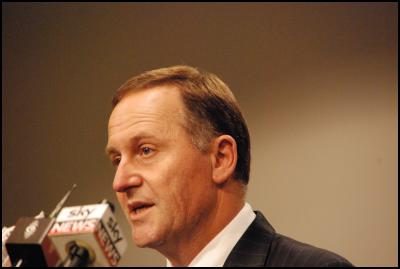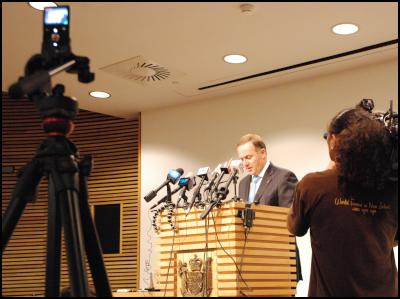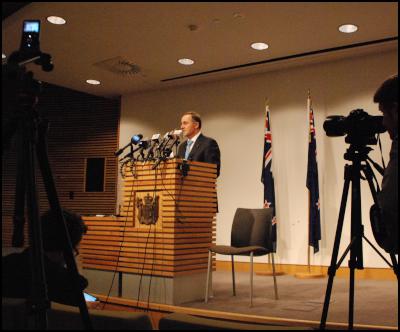Not Worrying About Tomorrow:
PM Press
Conference - 28th May, 2012
Scoop Audio + Video + Photos
By Mark P. Williams

Click for big version.
Today the Prime Minister outlined plans for his forthcoming trip to the UK and Europe. He indicated that he would be meeting with European Parliamentary representatives and representatives from NATO. While in London he will meet with the UK Prime Minister David Cameron and Dr Mervyn King, Governor of the Bank of England. In Berlin the Prime Minister will deliver two keynote speeches and meet with German Chancellor Angela Merkel. He will also launch the Friends of New Zealand Group in the European Parliament; he said that he hopes to increase New Zealand's bilateral relationships with NATO and the European Union.
The Prime Minister also announced that in honour of the Queen's Diamond Jubilee there will be four additional Members of the Order of New Zealand announced in the Queen's Birthday Honours list in line with the precedent of the Golden Jubilee.
He then took questions on teacher numbers and education policy, on retirement age, and on gay adoption. He was also asked about New Zealand's commitments to the environment after Rio20+ and the withdrawal from Afghanistan.
Questions
The PM was asked his
thoughts on David Shearers' invitation to discuss raising
the retirement age; he responded that his views on the
matter have not changed
Pressed further, he responded
that the Government had done their modelling up to 2020 and
was comfortable with the numbers, and added that he remained
focused on economic growth and he felt it to be "healthy for
a country to have those debates and political parties will
have to take their policies into the election campaign
2014." Pressed still further he responded that it was not
an immediate priority, adding "It may be for another day,
but not for today."
The PM was asked whether the Govt
was doing any other long-term work on issues like health
care, age care and dementia care; he responded that he had
not seen any particular work but had no doubt the minister
of health was looking into them; he emphasised that he saw
returning to surplus and encouraging economic growth as the
most important way of preparing for such issues.
The PM was asked about the impact education policy changes would have on technology teachers nationally and certain Intermediate schools. The PM said that the Ministry had always been aware that the policy would have a greater effect on certain schools and that was why they had set up a working group to take the pressure of those schools. He added that for the overwhelming number of schools, changes would be very modest and would not lose too many.
The PM was asked how many would be too many teachers for a school to lose; he responded that he would need more time to "define that fully". He re-emphasised the Government's position that they were attempting to put money into increasing the quality of teaching.
Asked more about job losses and changes to the overall number of teachers, the PM said that the numbers of teachers were actually remaining flat but rather would not be increasing.
The PM was asked about the Rio 20+ Earth Summit; he said that he decided not to go this year due to factors beyond his control and that he felt New Zealand had a good record on renewable energy, emissions trading and tree planting.
The PM was also asked about the issue of Gay Adoption; the PM responded that he didn't personally feel it was a significant issue he would put the emphasis on adoption in general. The PM was then asked if he would consider a change in the law; he said that the Government wouldn't look to put it on the Govt work programme because it wasn't a big enough issue.
The PM was asked about the NATO part of his trip to Europe, and whether the withdrawal from Afghanistan would be part of the talks; he responded that he would certainly be talking about it.
He was then asked whether New Zealand would be increasing its financial contribution to NATO efforts in Afghanistan; the PM said he would be reluctant to make a larger contribution than the $2m already suggested by the United States government.
The PM was asked whether he would address the negative impact on New Zealand of quantitative easing at his meeting with Mervyn King of the Bank of England; he responded that he might but it was an issue where the US had a greater impact on New Zealand than the UK or Europe.
The PM was also asked to describe the relationship between New Zealand and Samoa; he said that the Friendship Treaty had served both countries well and would be celebrating the fifty year anniversary.
Asked whether he would increase the amount that aged care homes could charge people in order to allow them to increase the wages of caregivers the PM said he was not looking into raising it.
The PM was also asked about Kiwifruit growers injecting antibiotics into their crop.
Click a link to play audio (or right-click
to download) in either
MP3 format or in OGG format.

Click for big version.

Click for big version.
ENDS



 Binoy Kampmark: Justifying The Egregious - John Howard And Spying On East Timor
Binoy Kampmark: Justifying The Egregious - John Howard And Spying On East Timor Martin LeFevre - Meditations: The Wasted Interregnums Of Obama And Biden
Martin LeFevre - Meditations: The Wasted Interregnums Of Obama And Biden Ian Powell: Gutting Specialised Health Teams Follows ‘Slash And Burn’ Strategy
Ian Powell: Gutting Specialised Health Teams Follows ‘Slash And Burn’ Strategy Gordon Campbell: On The Rise Of Simeon Brown
Gordon Campbell: On The Rise Of Simeon Brown Nicholas Khoo, The Conversation: Friend Or Foe? How Trump’s Threats Against ‘Free-Riding’ Allies Could Backfire
Nicholas Khoo, The Conversation: Friend Or Foe? How Trump’s Threats Against ‘Free-Riding’ Allies Could Backfire Ramzy Baroud: The Fight For Dignity - Reshaping Gaza’s Post-War Narrative
Ramzy Baroud: The Fight For Dignity - Reshaping Gaza’s Post-War Narrative